Overview
To effectively navigate a construction career path, individuals must familiarize themselves with the industry landscape. This involves:
- Assessing their skills and interests
- Exploring educational opportunities
- Networking extensively
- Embracing continuous learning
Practical steps, such as:
- Utilizing self-assessment tools
- Attending industry events
- Staying informed about market trends
collectively enhance career development and adaptability in a competitive environment. These strategies not only prepare individuals for the challenges ahead but also position them for success in a dynamic industry.
Key Highlights:
- Familiarity with the construction landscape includes sectors like residential, commercial, and industrial development.
- Specialized fields such as project management, engineering, and skilled trades are crucial for career navigation.
- Sustainable building practices and technology advancements are key trends impacting the construction industry.
- Self-assessment tools like O*NET and Myers-Briggs help evaluate personal skills and interests, enhancing job satisfaction.
- Educational opportunities include community colleges, vocational training, and certifications like those from NCCER.
- Networking through trade shows, seminars, and platforms like LinkedIn is essential for building industry connections.
- Continuous learning and adaptability are vital for long-term success in the evolving construction sector.
- Staying informed about market trends and obtaining relevant certifications increases marketability in a competitive job environment.
Introduction
Navigating a career in the construction industry presents both excitement and challenges, particularly within a landscape defined by rapid change and advancing technologies. Professionals must grasp the complexities of various sectors, including residential and commercial construction, while also recognizing the critical importance of sustainability and innovation. This article explores essential steps for aspiring construction workers:
- Self-assessment
- Educational opportunities
- Networking strategies
- The imperative of continuous learning
By examining these key areas, individuals can strategically position themselves for success and thrive in a field that is essential to shaping the future.
Understand the Construction Industry Landscape
To effectively navigate your career path in the building sector, it is essential to familiarize yourself with the current landscape. This includes a comprehensive understanding of various sectors such as:
- Residential development
- Commercial development
- Industrial development
Additionally, specialized fields like:
- Project management
- Engineering
- Skilled trades
By examining relevant reports and articles, you can uncover the latest trends, notably the increasing demand for sustainable building practices and how they relate to the construction career path and the impact of technology on construction processes. Resources from websites like the Associated General Contractors of America (AGC) and the Construction Industry Institute (CII) offer valuable insights into market conditions and future projections.
Moreover, consider attending conferences and seminars to gain firsthand knowledge and establish connections with industry professionals.
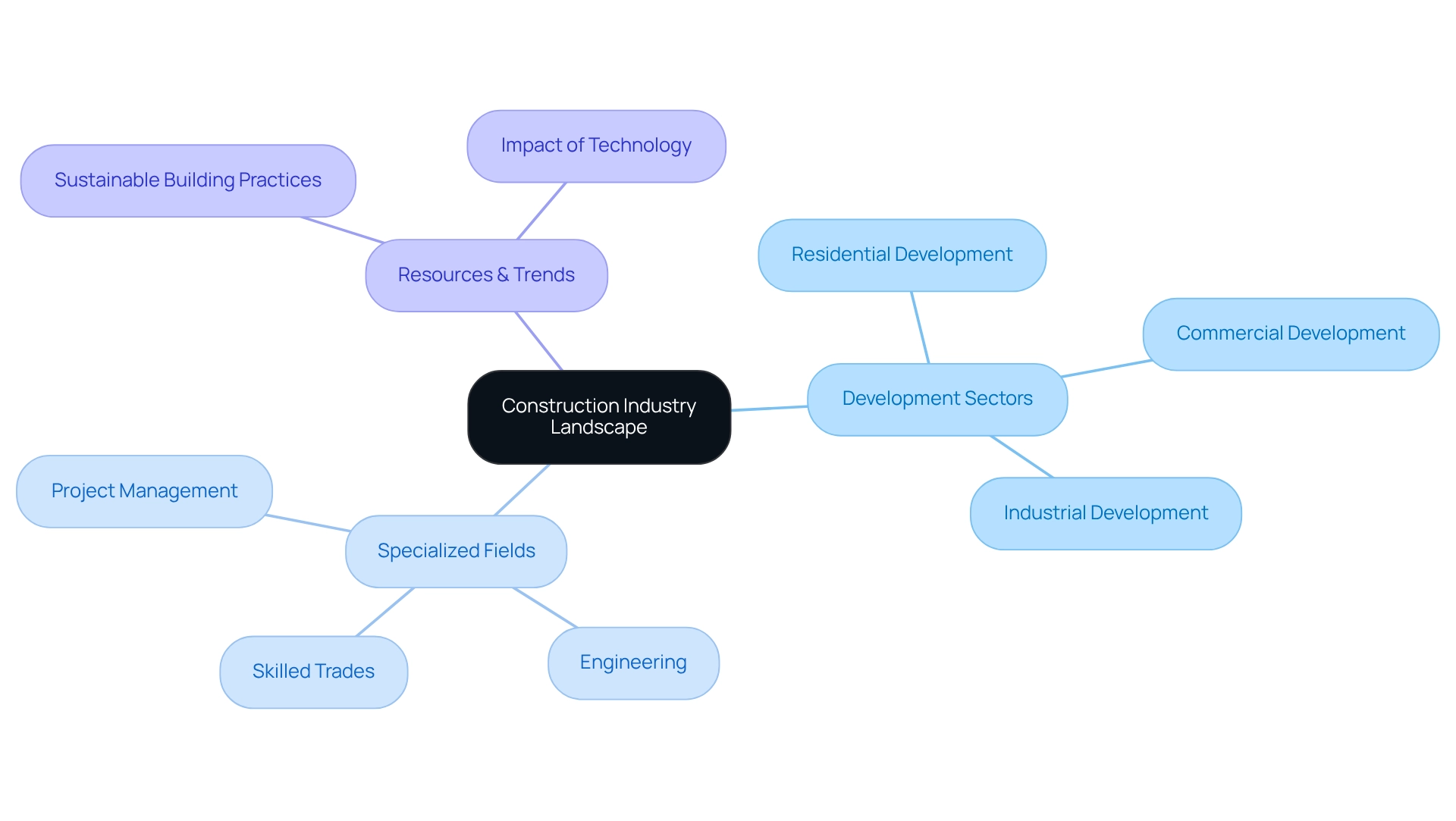
Assess Your Skills and Interests
To effectively evaluate your skills and interests in the building sector, begin by cataloging your current abilities, experiences, and areas of expertise. Tools like the O*NET Interest Profiler can yield valuable insights into your preferences and strengths, while assessments such as the Myers-Briggs Type Indicator can further clarify your personality traits. Reflecting on past experiences in building or related fields will aid in identifying which aspects you found most fulfilling.
Moreover, gathering feedback from mentors or colleagues can provide an external perspective on your skills, enriching your self-assessment process. Research indicates that self-evaluation significantly enhances job satisfaction, particularly in the construction career path, by ensuring that job choices align with personal strengths and values. This underscores self-assessment as a crucial step in your professional development journey.
As Jane Harper, a career development expert, aptly states, ‘If you are considering a career change or looking to advance in your current role, I encourage you to use career self-assessment tools to help you make informed decisions about your future.’
Furthermore, insights from the case study titled ‘The Role of Self-Assessments in Succession Planning’ emphasize how self-assessments can facilitate data-driven succession planning by revealing strengths and growth areas within teams. This approach not only enhances role alignment but also fosters cooperation within building teams.
After completing your self-evaluation, consider exploring specific positions within the building industry that align with your strengths as you navigate your construction career path, whether in project management, design, or practical trades.
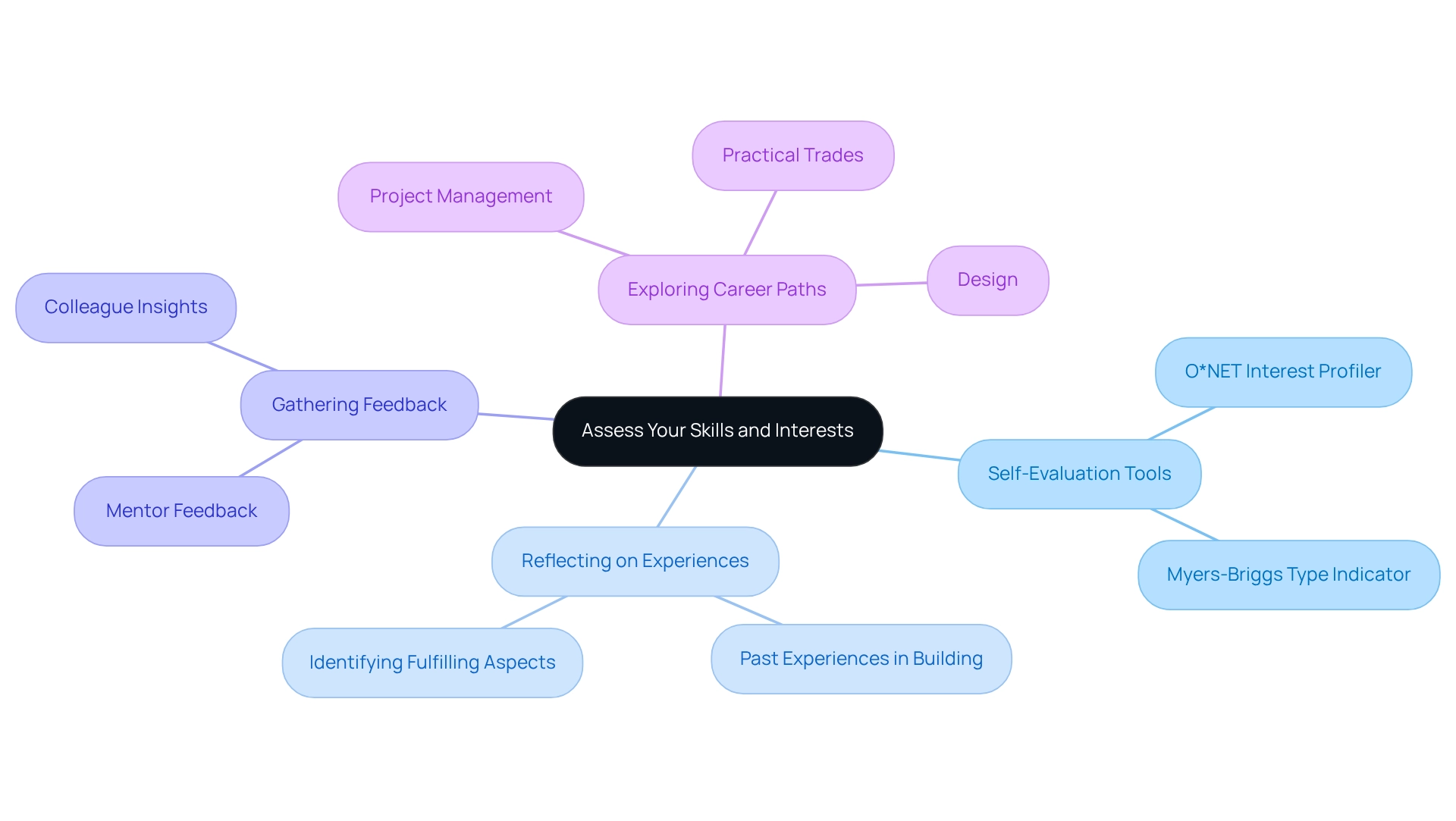
Explore Educational and Training Opportunities
After evaluating your skills and interests, the subsequent step involves exploring educational and training opportunities that will elevate your qualifications. Investigate local community colleges, vocational institutions, and digital platforms offering courses in project management, safety certifications, and specialized trades. Notably, programs like the National Center for Construction Education and Research (NCCER) provide structured training and certification across various trade skills.
Furthermore, consider pursuing apprenticeships or internships that deliver practical experience and mentorship. Engaging with industry experts can yield valuable recommendations for credible training programs aligned with your career aspirations.
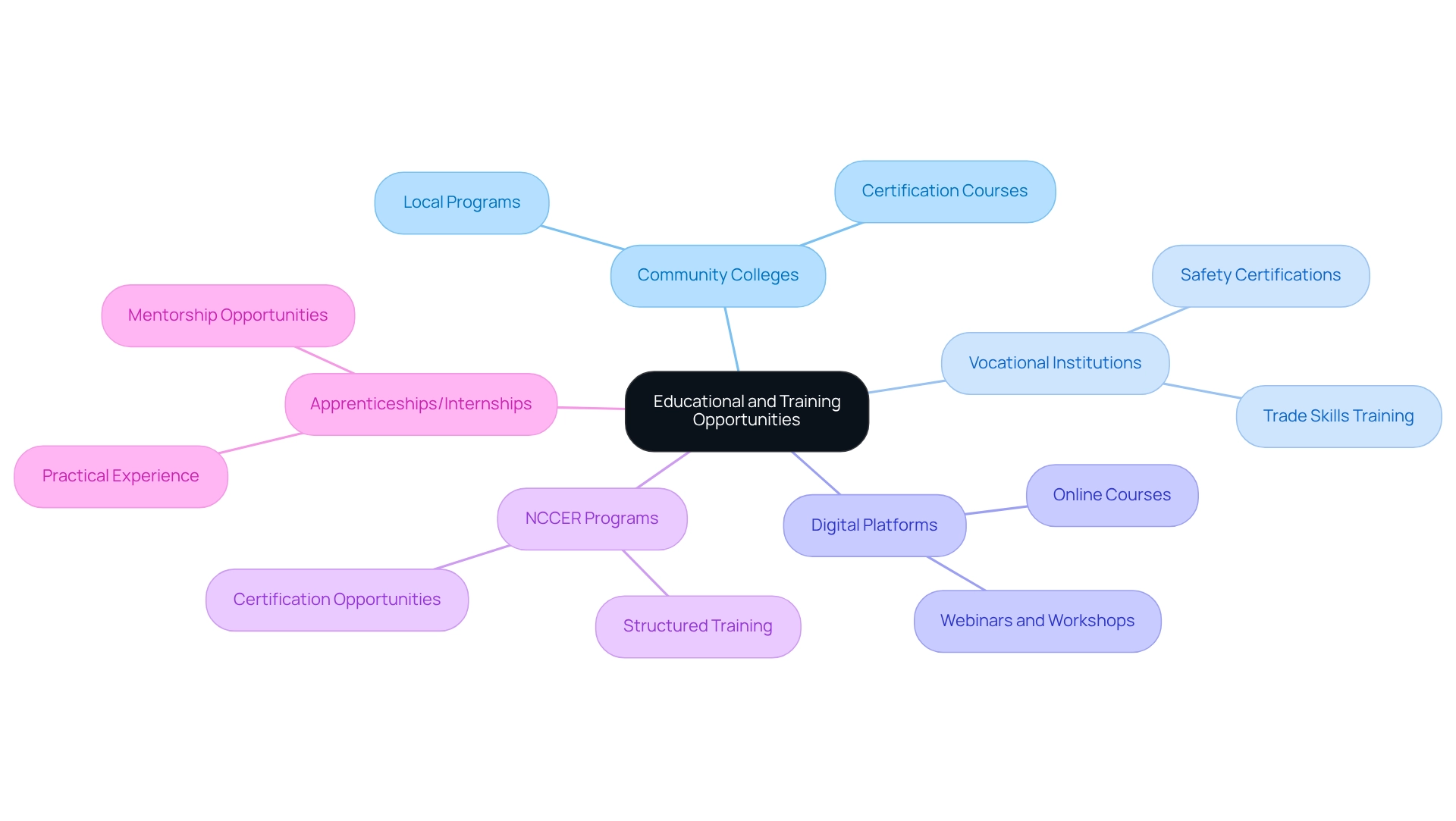
Network and Build Industry Connections
To effectively network and forge connections in the construction industry, it is imperative to prioritize attendance at sector-specific events, including trade shows, seminars, and local chapter meetings of organizations such as the Associated General Contractors (AGC) and the Construction Management Association of America (CMAA). These gatherings not only facilitate face-to-face interactions but also cultivate enduring relationships, which are essential in a field where 61% of employees favor in-person meetings for establishing connections. For instance, CMAA events often feature networking sessions that allow individuals to engage directly with industry leaders and peers, thereby enhancing opportunities for collaboration and mentorship.
Furthermore, leverage social media platforms, particularly LinkedIn, to expand your career network. Join relevant groups, engage in discussions, share insights, and seek guidance from seasoned professionals in your desired field. This digital approach complements traditional networking strategies, as 40% of professionals now employ hybrid models for networking. A report by Jobvite reveals that 18% of workers have secured their current positions through friends or former colleagues, underscoring the significance of harnessing personal connections in your networking endeavors.
Additionally, tap into your educational alumni network. Graduates working in construction can offer invaluable insights and may assist you in uncovering job opportunities. By integrating these strategies, you can enhance your visibility and cultivate meaningful connections that are crucial for advancing your construction career path. The effectiveness of both virtual and in-person networking methods suggests that a balanced approach will yield optimal results in building your professional network.
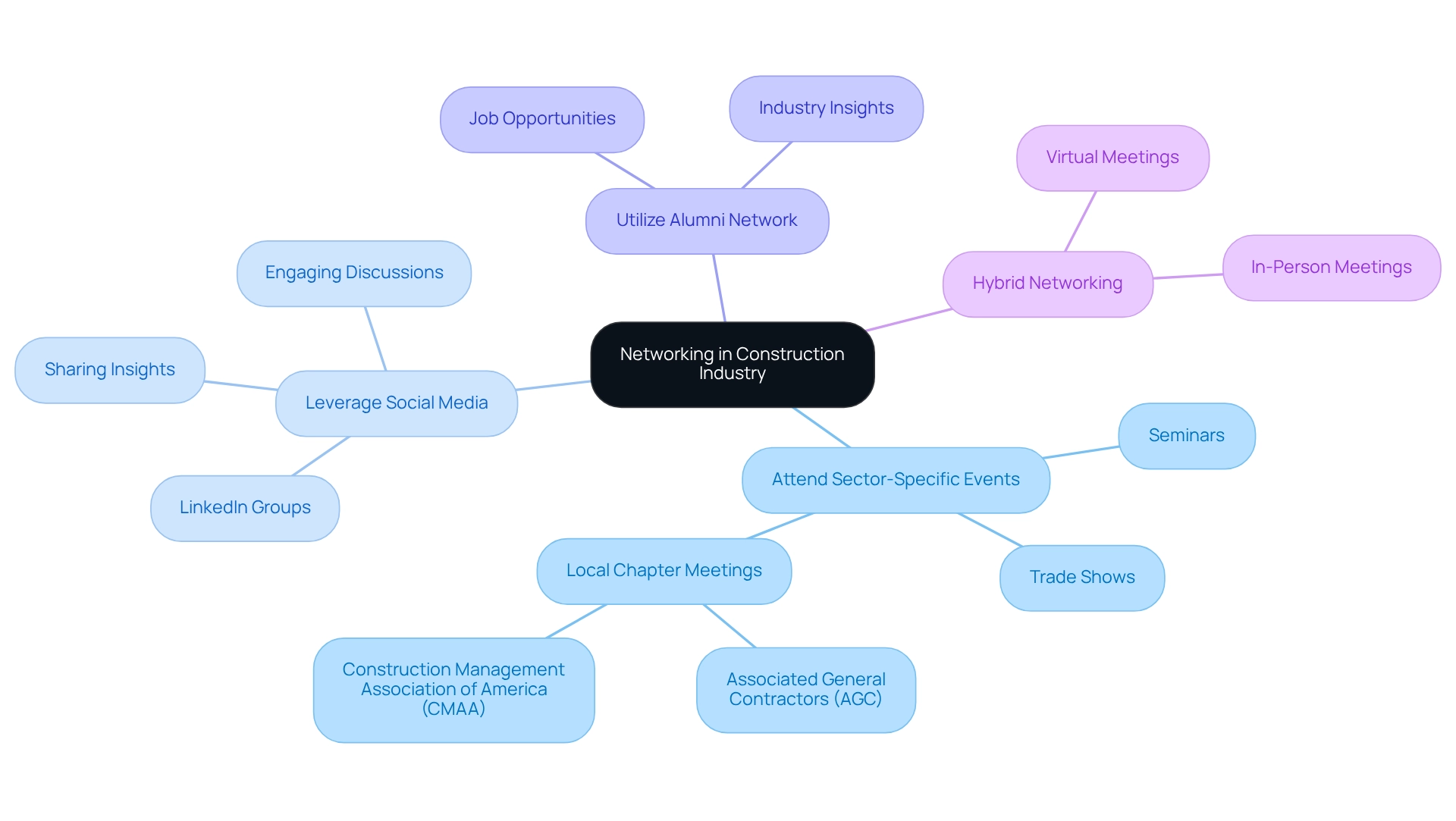
Embrace Continuous Learning and Adaptability
In the dynamic construction sector, following a construction career path requires ongoing education and flexibility to achieve long-term success. Keeping up with market trends, emerging technologies, and best practices is essential. Statistics suggest that disrupted material deliveries could prolong project schedules and increase expenses, highlighting the importance of remaining informed about sector practices.
- Enrolling in trade publications and participating in development courses can greatly improve your knowledge base.
- Obtaining relevant certifications not only boosts your skill set but also increases your marketability along your construction career path in a competitive job market.
- Participating in online forums and discussion groups fosters knowledge sharing and peer learning, creating a supportive community for professionals.
By fostering a mindset of lifelong learning, you prepare yourself to effectively navigate changes in the construction career path and seize new opportunities as they arise.
As the building environment progresses, especially in 2025, keeping informed about the latest certifications and industry advancements will be essential. Case studies reveal that companies adapting to technological changes, such as implementing digital document management systems, have seen improved operational efficiency and decision-making capabilities. As Trimble states, “This integration makes operations more efficient and helps teams make smarter decisions with a clearer picture of what’s happening on-site.”
Furthermore, the case study titled “Political Winds and Economic Realities” illustrates how companies are reevaluating their supply chain strategies in response to political uncertainties, emphasizing the importance of adaptability. Embracing these strategies will not only enhance individual career trajectories along the construction career path but also contribute to the overall resilience and adaptability of the construction workforce.
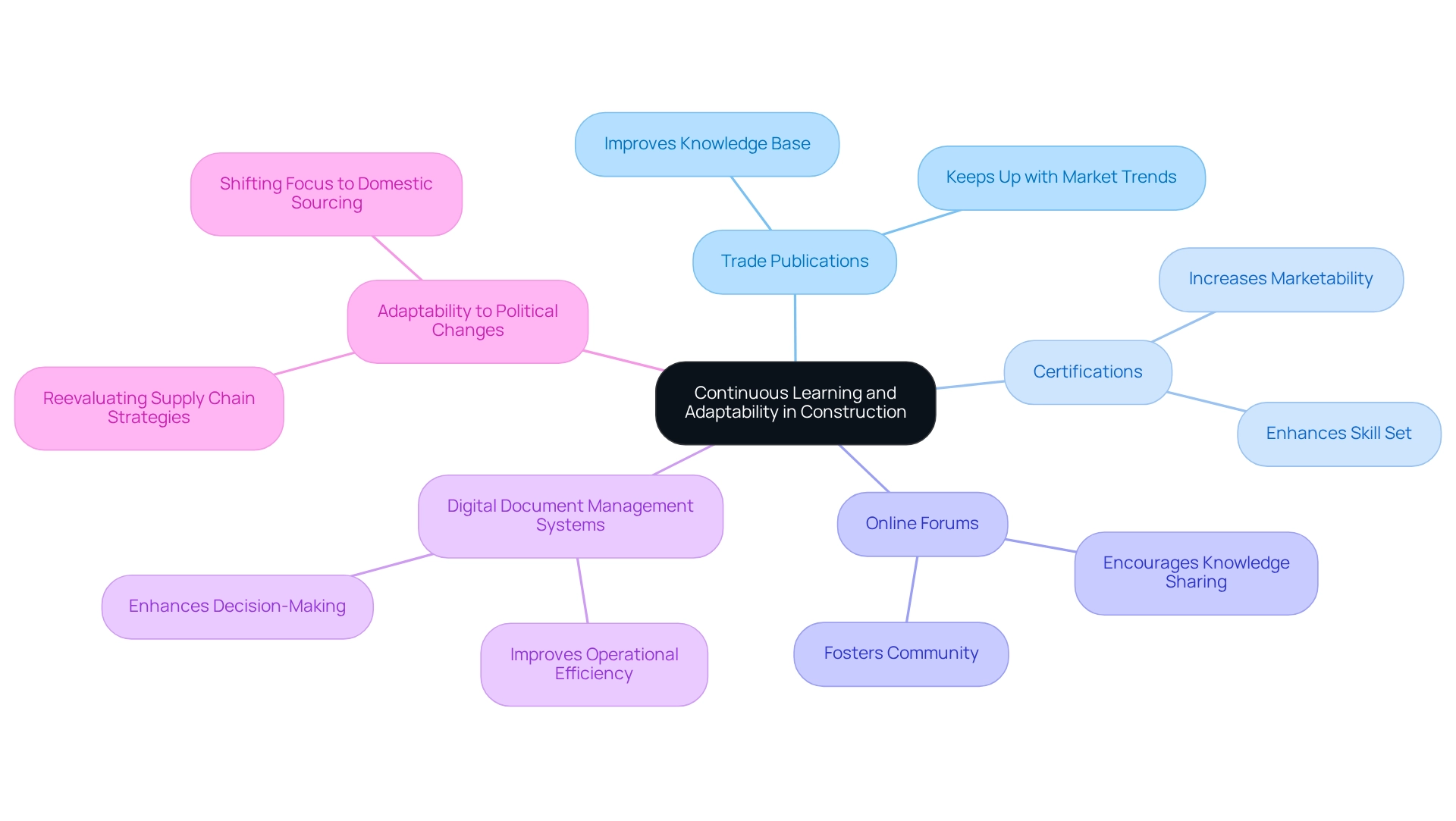
Conclusion
Understanding the construction industry landscape is the first crucial step for anyone aiming to build a successful career in this dynamic field. Familiarizing oneself with various sectors, such as residential and commercial construction, while staying informed about emerging trends like sustainability and technological advancements, empowers aspiring professionals to navigate their career paths more effectively.
Self-assessment plays a vital role in aligning personal strengths and interests with suitable career opportunities. By utilizing assessment tools and reflecting on past experiences, individuals can identify roles that resonate with their skills and values. This alignment ultimately leads to greater job satisfaction and effective collaboration within construction teams.
Exploring educational and training opportunities is essential for enhancing qualifications and gaining practical experience. From community colleges to apprenticeships, these pathways equip individuals with the necessary skills to thrive in various construction roles. Additionally, networking and building industry connections amplify career prospects. Attending events and leveraging social media can open doors to valuable mentorship and job opportunities.
Embracing continuous learning and adaptability is paramount in a field characterized by rapid change. Staying informed about industry trends, obtaining relevant certifications, and participating in professional development initiatives ensure that construction professionals remain competitive and can effectively respond to evolving demands.
In conclusion, a proactive approach that combines self-assessment, education, networking, and lifelong learning not only positions individuals for success in the construction industry but also contributes to the overall growth and resilience of the workforce. By taking these essential steps, aspiring construction workers can carve out fulfilling careers that significantly impact the industry’s future.
Frequently Asked Questions
What are the main sectors to understand when navigating a career in the building sector?
The main sectors include residential development, commercial development, and industrial development.
Which specialized fields should one be aware of in the building sector?
Specialized fields to be aware of include project management, engineering, and skilled trades.
How can I stay updated on the latest trends in the building sector?
You can stay updated by examining relevant reports and articles, particularly focusing on trends like sustainable building practices and technology’s impact on construction processes.
What resources are recommended for insights into market conditions and future projections in the construction industry?
Resources from the Associated General Contractors of America (AGC) and the Construction Industry Institute (CII) are recommended for valuable insights.
How can attending events benefit my career in the building sector?
Attending conferences and seminars can provide firsthand knowledge and help establish connections with industry professionals.
What initial steps should I take to evaluate my skills and interests in the building sector?
Begin by cataloging your current abilities, experiences, and areas of expertise, and consider using tools like the O*NET Interest Profiler for insights.
How can personality assessments aid in evaluating my career path?
Assessments such as the Myers-Briggs Type Indicator can clarify your personality traits and help identify which aspects of the building sector you may find fulfilling.
Why is self-assessment important in the construction career path?
Self-assessment enhances job satisfaction by ensuring that job choices align with personal strengths and values, which is crucial for professional development.
How can feedback from mentors or colleagues contribute to my self-assessment?
Feedback from mentors or colleagues provides an external perspective on your skills, enriching the self-assessment process.
What should I do after completing my self-evaluation in the building industry?
After self-evaluation, explore specific positions within the building industry that align with your strengths, such as project management, design, or practical trades.
{“@context”: “https://schema.org”, “@type”: “FAQPage”, “mainEntity”: [{“@type”: “Question”, “name”: “What are the main sectors to understand when navigating a career in the building sector?”, “acceptedAnswer”: {“@type”: “Answer”, “text”: “The main sectors include residential development, commercial development, and industrial development.”}}, {“@type”: “Question”, “name”: “Which specialized fields should one be aware of in the building sector?”, “acceptedAnswer”: {“@type”: “Answer”, “text”: “Specialized fields to be aware of include project management, engineering, and skilled trades.”}}, {“@type”: “Question”, “name”: “How can I stay updated on the latest trends in the building sector?”, “acceptedAnswer”: {“@type”: “Answer”, “text”: “You can stay updated by examining relevant reports and articles, particularly focusing on trends like sustainable building practices and technology’s impact on construction processes.”}}, {“@type”: “Question”, “name”: “What resources are recommended for insights into market conditions and future projections in the construction industry?”, “acceptedAnswer”: {“@type”: “Answer”, “text”: “Resources from the Associated General Contractors of America (AGC) and the Construction Industry Institute (CII) are recommended for valuable insights.”}}, {“@type”: “Question”, “name”: “How can attending events benefit my career in the building sector?”, “acceptedAnswer”: {“@type”: “Answer”, “text”: “Attending conferences and seminars can provide firsthand knowledge and help establish connections with industry professionals.”}}, {“@type”: “Question”, “name”: “What initial steps should I take to evaluate my skills and interests in the building sector?”, “acceptedAnswer”: {“@type”: “Answer”, “text”: “Begin by cataloging your current abilities, experiences, and areas of expertise, and consider using tools like the O*NET Interest Profiler for insights.”}}, {“@type”: “Question”, “name”: “How can personality assessments aid in evaluating my career path?”, “acceptedAnswer”: {“@type”: “Answer”, “text”: “Assessments such as the Myers-Briggs Type Indicator can clarify your personality traits and help identify which aspects of the building sector you may find fulfilling.”}}, {“@type”: “Question”, “name”: “Why is self-assessment important in the construction career path?”, “acceptedAnswer”: {“@type”: “Answer”, “text”: “Self-assessment enhances job satisfaction by ensuring that job choices align with personal strengths and values, which is crucial for professional development.”}}, {“@type”: “Question”, “name”: “How can feedback from mentors or colleagues contribute to my self-assessment?”, “acceptedAnswer”: {“@type”: “Answer”, “text”: “Feedback from mentors or colleagues provides an external perspective on your skills, enriching the self-assessment process.”}}, {“@type”: “Question”, “name”: “What should I do after completing my self-evaluation in the building industry?”, “acceptedAnswer”: {“@type”: “Answer”, “text”: “After self-evaluation, explore specific positions within the building industry that align with your strengths, such as project management, design, or practical trades.”}}]}{“@context”: “https://schema.org”, “@type”: “BlogPosting”, “headline”: “5 Steps to Navigate Your Construction Career Path”, “description”: “Discover essential steps to effectively navigate your construction career path.”, “datePublished”: “2025-05-14T00:00:04.372000”, “image”: [“https://images.tely.ai/telyai/znlolllu-the-central-node-represents-the-overall-landscape-while-branches-show-key-sectors-and-specialties-each-sub-branch-indicates-specific-fields-of-study-or-focus-areas-helping-you-understand-the-broader-context-of-the-industry.webp”, “https://images.tely.ai/telyai/dxexoshk-the-central-node-represents-the-overall-theme-of-assessing-skills-each-branch-shows-a-different-aspect-of-the-assessment-process-with-further-details-available-in-the-sub-branches-this-layout-helps-you-see-how-different-tools-and-considerations-connect-to-your-career-development.webp”, “https://images.tely.ai/telyai/qwojqorc-the-center-represents-the-main-theme-of-education-and-training-each-branch-shows-different-paths-you-can-take-like-community-colleges-or-apprenticeships-and-further-details-can-be-found-by-following-the-sub-branches.webp”, “https://images.tely.ai/telyai/sojkhpcy-the-center-represents-the-main-theme-of-networking-and-each-branch-shows-different-strategies-you-can-use-to-build-connections-explore-the-sub-branches-for-specific-actions-that-can-enhance-your-networking-efforts.webp”, “https://images.tely.ai/telyai/vjosczkz-the-central-idea-is-about-continuous-learning-and-adaptability-in-the-construction-field-each-branch-shows-a-specific-strategy-or-insight-related-to-this-theme-and-the-sub-branches-explain-their-significance-the-colors-and-layout-help-you-easily-navigate-through-the-various-aspects-of-building-a-successful-construction-career.webp”], “articleBody”: “## Overview\nTo effectively navigate a construction career path, individuals must familiarize themselves with the industry landscape. This involves:\n\n1. Assessing their skills and interests\n2. Exploring educational opportunities\n3. Networking extensively\n4. Embracing continuous learning\n\nPractical steps, such as:\n\n- Utilizing self-assessment tools\n- Attending industry events\n- Staying informed about market trends\n\ncollectively enhance career development and adaptability in a competitive environment. These strategies not only prepare individuals for the challenges ahead but also position them for success in a dynamic industry.\n\n## Key Highlights:\n- Familiarity with the construction landscape includes sectors like residential, commercial, and industrial development.\n- Specialized fields such as project management, engineering, and skilled trades are crucial for career navigation.\n- Sustainable building practices and technology advancements are key trends impacting the construction industry.\n- Self-assessment tools like O*NET and Myers-Briggs help evaluate personal skills and interests, enhancing job satisfaction.\n- Educational opportunities include community colleges, vocational training, and certifications like those from NCCER.\n- Networking through trade shows, seminars, and platforms like LinkedIn is essential for building industry connections.\n- Continuous learning and adaptability are vital for long-term success in the evolving construction sector.\n- Staying informed about market trends and obtaining relevant certifications increases marketability in a competitive job environment.\n\n## Introduction\nNavigating a career in the construction industry presents both excitement and challenges, particularly within a landscape defined by rapid change and advancing technologies. Professionals must grasp the complexities of various sectors, including residential and commercial construction, while also recognizing the critical importance of sustainability and innovation. This article explores essential steps for aspiring construction workers:\n\n1. Self-assessment\n2. Educational opportunities\n3. Networking strategies\n4. The imperative of continuous learning\n\nBy examining these key areas, individuals can strategically position themselves for success and thrive in a field that is essential to shaping the future.\n\n## Understand the Construction Industry Landscape\nTo effectively [navigate your career path](https://boutiquerecruiting.com) in the building sector, it is essential to familiarize yourself with the current landscape. This includes a comprehensive understanding of various sectors such as:\n\n1. Residential development\n2. Commercial development\n3. Industrial development\n\nAdditionally, specialized fields like:\n\n1. Project management\n2. Engineering\n3. Skilled trades\n\nBy examining relevant reports and articles, you can uncover the latest trends, notably the increasing demand for sustainable building practices and how they relate to the construction career path and the impact of technology on construction processes. Resources from websites like the Associated General Contractors of America (AGC) and the Construction Industry Institute (CII) offer valuable insights into market conditions and future projections. \n\nMoreover, consider attending conferences and seminars to gain firsthand knowledge and establish connections with industry professionals.\n\n\n## Assess Your Skills and Interests\nTo effectively evaluate your skills and interests in the building sector, begin by cataloging your current abilities, experiences, and areas of expertise. Tools like the O*NET Interest Profiler can yield valuable insights into your preferences and strengths, while assessments such as the Myers-Briggs Type Indicator can further clarify your personality traits. Reflecting on past experiences in building or related fields will aid in identifying which aspects you found most fulfilling. \n\nMoreover, gathering feedback from mentors or colleagues can provide an external perspective on your skills, enriching your self-assessment process. Research indicates that self-evaluation significantly enhances job satisfaction, particularly in the construction career path, by ensuring that job choices align with personal strengths and values. This underscores [self-assessment](https://careerguidanceadvice.com/why-self-assessment-is-crucial-for-successful-career-exploration) as a crucial step in your professional development journey. \n\nAs Jane Harper, a career development expert, aptly states, ‘If you are considering a career change or looking to advance in your current role, I encourage you to use career self-assessment tools to help you make informed decisions about your future.’ \n\nFurthermore, insights from the case study titled ‘The Role of Self-Assessments in Succession Planning’ emphasize how self-assessments can facilitate data-driven succession planning by revealing strengths and growth areas within teams. This approach not only enhances role alignment but also fosters cooperation within building teams. \n\nAfter completing your self-evaluation, consider exploring specific positions within the building industry that align with your strengths as you navigate your construction career path, whether in project management, design, or practical trades.\n\n\n## Explore Educational and Training Opportunities\nAfter evaluating your skills and interests, the subsequent step involves exploring educational and training opportunities that will elevate your qualifications. Investigate local community colleges, vocational institutions, and digital platforms offering courses in project management, safety certifications, and specialized trades. Notably, programs like the National Center for Construction Education and Research (NCCER) provide structured training and certification across various trade skills. \n\nFurthermore, consider pursuing apprenticeships or internships that deliver practical experience and mentorship. Engaging with industry experts can yield valuable recommendations for credible training programs aligned with your career aspirations.\n\n\n## Network and Build Industry Connections\nTo effectively network and forge connections in the construction industry, it is imperative to prioritize attendance at [sector-specific events](https://developcoaching.co.uk/construction-networking), including trade shows, seminars, and local chapter meetings of organizations such as the Associated General Contractors (AGC) and the Construction Management Association of America (CMAA). These gatherings not only facilitate face-to-face interactions but also cultivate enduring relationships, which are essential in a field where 61% of employees favor in-person meetings for establishing connections. For instance, CMAA events often feature networking sessions that allow individuals to engage directly with industry leaders and peers, thereby enhancing opportunities for collaboration and mentorship. \n\nFurthermore, leverage social media platforms, particularly LinkedIn, to expand your career network. Join relevant groups, engage in discussions, share insights, and seek guidance from seasoned professionals in your desired field. This digital approach complements traditional networking strategies, as 40% of professionals now employ hybrid models for networking. A report by Jobvite reveals that 18% of workers have secured their current positions through friends or former colleagues, underscoring the significance of harnessing personal connections in your networking endeavors. \n\nAdditionally, tap into your educational alumni network. Graduates working in construction can offer invaluable insights and may assist you in uncovering job opportunities. By integrating these strategies, you can enhance your visibility and cultivate meaningful connections that are crucial for advancing your construction career path. The effectiveness of both virtual and in-person networking methods suggests that a balanced approach will yield optimal results in building your professional network.\n\n\n## Embrace Continuous Learning and Adaptability\nIn the dynamic construction sector, following a construction career path requires ongoing education and flexibility to achieve long-term success. Keeping up with market trends, emerging technologies, and best practices is essential. Statistics suggest that disrupted material deliveries could prolong project schedules and increase expenses, highlighting the importance of remaining informed about sector practices.\n\n- Enrolling in trade publications and participating in development courses can greatly improve your knowledge base.\n- Obtaining relevant certifications not only boosts your skill set but also increases your marketability along your construction career path in a competitive job market.\n- Participating in online forums and discussion groups fosters knowledge sharing and peer learning, creating a supportive community for professionals.\n\nBy fostering a mindset of lifelong learning, you prepare yourself to effectively navigate changes in the construction career path and seize new opportunities as they arise.\n\nAs the building environment progresses, especially in 2025, keeping informed about the latest certifications and industry advancements will be essential. Case studies reveal that companies adapting to technological changes, such as implementing digital document management systems, have seen [improved operational efficiency](https://trimble.com/en/blog/top-construction-software-trends) and decision-making capabilities. As Trimble states, \”This integration makes operations more efficient and helps teams make smarter decisions with a clearer picture of what\u2019s happening on-site.\”\n\nFurthermore, the case study titled \”Political Winds and Economic Realities\” illustrates how companies are reevaluating their supply chain strategies in response to political uncertainties, emphasizing the importance of adaptability. Embracing these strategies will not only enhance individual career trajectories along the construction career path but also contribute to the overall resilience and adaptability of [the construction workforce](https://www.boutiquerecruiting.com/best-practices-for-construction-hiring-proven-strategies-for-success-in-the-industry/).\n\n\n\n## Conclusion\nUnderstanding the construction industry landscape is the first crucial step for anyone aiming to build a successful career in this dynamic field. Familiarizing oneself with various sectors, such as residential and commercial construction, while staying informed about emerging trends like sustainability and technological advancements, empowers aspiring professionals to navigate their career paths more effectively. \n\nSelf-assessment plays a vital role in aligning personal strengths and interests with suitable career opportunities. By utilizing assessment tools and reflecting on past experiences, individuals can identify roles that resonate with their skills and values. This alignment ultimately leads to greater job satisfaction and effective collaboration within construction teams. \n\nExploring educational and training opportunities is essential for enhancing qualifications and gaining practical experience. From community colleges to apprenticeships, these pathways equip individuals with the necessary skills to thrive in various construction roles. Additionally, networking and building industry connections amplify career prospects. Attending events and leveraging social media can open doors to valuable mentorship and job opportunities. \n\nEmbracing continuous learning and adaptability is paramount in a field characterized by rapid change. Staying informed about industry trends, obtaining relevant certifications, and participating in professional development initiatives ensure that construction professionals remain competitive and can effectively respond to evolving demands. \n\nIn conclusion, a proactive approach that combines self-assessment, education, networking, and lifelong learning not only positions individuals for success in the construction industry but also contributes to the overall growth and resilience of the workforce. By taking these essential steps, aspiring construction workers can carve out fulfilling careers that significantly impact the industry’s future.\n\n::iframe[https://iframe.tely.ai/cta/eyJhcnRpY2xlX2lkIjogIjY4MjNkZDA0MTUyMmM2Y2RlZTBjMzRmNCIsICJjb21wYW55X2lkIjogIjY3YWU2NGU5YzhlZTg4N2E0ZmUzZmYxOSIsICJpbmRleCI6IG51bGx9]{width=\”100%\” height=\”300px\”}”}